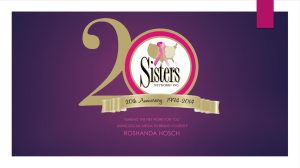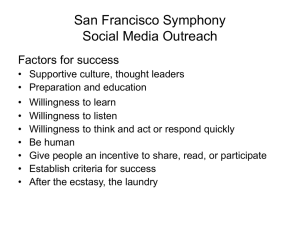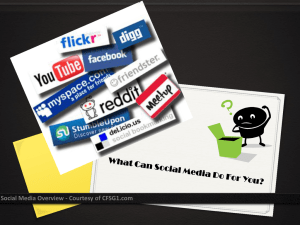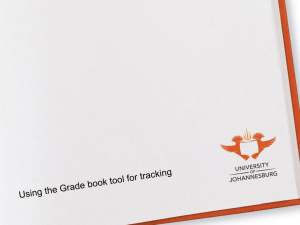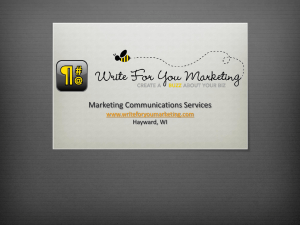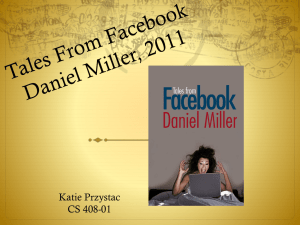Presentation
advertisement
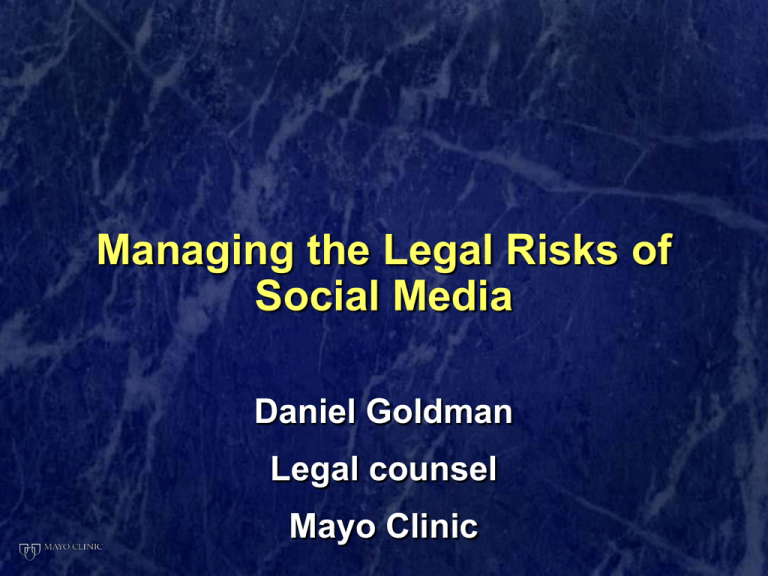
Managing the Legal Risks of Social Media Daniel Goldman Legal counsel Mayo Clinic What is “Social Media”? • “social” websites in which users interact with the site and each other • interconnected networks of friends or followers The Power of Social Media The Social Media Revolution Major Social Media Sites • Facebook •King of the hill: 500 million active users. 250 million logon each day Major Social Media Sites • MySpace •Started the revolution; now a historical artifact •Younger demographic •Shifted focus to music and entertainment •200 million users •May be in death spiral: 1/11 laid off 50% of work force Major Social Media Sites • Twitter • Broadcast texting to “followers”: • 140 character “tweets” • Can include links • Subscription model • “Follow” people to get their tweets • People who follow you get your tweets • Claims 175M active users • 1B tweets sent weekly Twitter • Become a business tool • Channel for sharing professional • news/information • HIPAA breach notification rules • Red flag rule postponement. • New Massachusetts privacy revisions Huge marketing reach • Quick, nimble, dynamic • Able to quickly interact with massive numbers of customers/potential customers Twitter Twitter: Companies Engaging With their Customers Twitter Major Social Media Sites • Linked In •Professional Networking Site •Can post status updates and send messages Major Social Media Sites • YouTube •Video sharing site •300 million visitors per month Major Social Media Sites • Yammer •“private” social network for companies •Used by 90,000 companies; 80% of F500 Major Social Media Sites • Location-based social media sites • Foursquare • Check in at various locations to let others • know where you are • Become “Mayor of a location” • Earn rewards/discounts from retailers based on number of check ins • Leave reviews/comments on locations/retailers • 200k users 12/09 5M users 10/10 Major sites adding location/check-in features • Facebook Places • 30M users have tried Location-Based Social Media: Foursquare Foursquare Foursquare Foursquare Foursquare Who’s Using Social Media: Individuals • Recent Harris poll (1/11) • 65% of Americans report themselves a social media users • Up from 35% in 2008 • Older users rise dramatically • Baby boomers (46-64) 9%-43% • Mature (65+) 4%-16% Who’s Using Social Media: Businesses • 80% of Fortune Global 100 companies use some form of social media (blogs, twitter, facebook) • Most used: • Twitter: 60% • Facebook: 54% • YouTube: 50% Source: Burson-Marsteller Fortune Global100 Social Media Study 2/2010 Social Media Adoption in Healthcare • 906 US hospitals using social media (approx 15%) • 719 Facebook pages • 674 Twitter Accounts • 439 YouTube Channels • 439 LinkedIn Accounts • 106 Blogs Source: www.edbenett.org Most Popular Twitter feeds • Mayo Clinic (MN/AZ/FL): • 97,000 followers • St. Jude Children’s (TN) • 11,000 followers • Children’s Nat’l Med Ctr (DC) • 8,600 followers • Emory John’s Creek Hosp (GA) • 8,300 followers • Aurora St. Luke’s (WI) • 8,300 Most popular Facebook Pages • St. Jude’s (TN) • 338,000 fans • Children’s Hospital of Boston (MA) • 475,000 fans • Arkansas Children’s Hosp (AR) • 76,000 fans • Mayo Clinic (MN/AZ/FL) • 35,000 fans • VHA (DC) • 30,000 fans Common Uses of Social Media in Healthcare • Deliver information • health and wellness • Your hospital/brand • Connect and interact with patients, potential patients and “friends” of your brand • Foster online communities • Patients and individuals can interact with each other re health and your brand Benefits of Business Use of Social Media • Interactive nature: Dialogue not monologue • More meaningful interactions • Chance to listen as well as speak to your customers: free market research • More trusted than advertising • Community • Particularly powerful with health issues • Esp significant/chronic health conditions (e.g. depression) Benefits of Business Use of Social Media • It’s where the people are, esp. under 30 • Can interact with/influence large numbers of people • It’s free • Did I mention that it’s free? Why is Mayo Clinic Involved in Social Media • Build our brand • How our brand has grown for last 100 years • Hi-Tech WOM • Powerful tool to deliver health information • Power and immediacy of community Benefits of Using Social Media in Healthcare • “Social media gives me access to a world of people living with type 1 diabetes, just like me. Any hour of the day or night I can tune in to discussions on Twitter or Facebook, I can read thousands of blog posts written by people from all walks of life, all living with type 1 diabetes, and I can find YouTube videos that make me laugh and cry. I can find connections. I can find people who understand exactly what I’m going through. These people and their stories become an emotional lifeline. Suddenly I don’t feel so alone or isolated. In fact I often feel inspired and empowered by what I’ve seen.” • Scott Johnson http://www.diabetesdaily.com/johnson/ Mayo Clinic: Facebook, Twitter, Youtube, Blog Changing Health Communication • Mayo Clinic Center for Social Media •Create resources for use at Mayo Clinic that can be shared with organizations wanting to use social media in health and health care • Social Media Health Network •Membership group for orgs wanting to use social media to improve healthcare •Sharing, Collaboration development of resources Challenges of Social Media • Speed • Interconnected nature of social networks means information moves quickly • Less time to analyze and react than traditional media Challenges of Social Media • Reach •Social media gives individuals access to staggering numbers of people Challenges of Social Media • Reach • “United Breaks Guitars" video on YouTube: 10 million views Challenges of Social Media • Blurring of professional/personal lives • Most social media sites encourage sharing of • • • • info about professional lives Difficult to separate what happens at work from other events in your life Difficult to not reveal where you work Many challenges when lawful personal conduct is in tension with professional expectations Particular challenge in professions such as healthcare/legal with high ethical expectations Challenges of Social Media • Generation of “lifecasters” • Expectation of sharing of all details of life • Including what happens at work • Not the same expectation of privacy as older generation • In tension with increasingly strict privacy laws Challenges Unique to Specific Industries • Privacy • HIPAA, GLBA and state privacy laws make • • information sharing a challenge in privacyregulated industries such as healthcare, financial services, legal. Stakes are high if employees act inappropriately • Fines, lawsuits • PR and Brand risks Can limit your ability to respond to critics and unhappy customers Ethical Issues: “Friending” Clients • Raises challenging issues regarding appropriate boundaries for professional relationships • Blurs what is and isn’t part of the professional • • relationship Particular issue with respect to lawyers friending judges and other litigants/clients, physicians friending patients Professions are just beginning to sort out the ethical issues Managing Risk Through Social Media Policies: General Thoughts • No “one size fits all” approach. • Policy is as much a reflection of corporate culture as law • Must understand your company’s brand, tolerance for dissent and risk, relationship with workforce and balance that with what the law allows Social Media is a Dialogue, Not a Monologue • Traditional marketing/advertising • billboard • Pro: Advertiser controls message • Con: People no longer trust, no ability to hear what customer wants • Social media • Conversation • Pro: interactive, people trust, you can hear • what’s important to your customer Con: much less control. “Community” expects you will respond to criticism, not “censor” it. Social Media is a Dialogue, Not a Monologue • Expectation is that people will talk back to you, and that you will listen. • Must have a thick skin to participate in social media • You may have to tolerate some things you don’t like • Esp challenging in Healthcare: HIPAA limits your response to criticism Social Media is a Dialogue, Not a Monologue • Even if you can respond, should you? Social Media is a Dialogue, Not a Monologue • However: cannot really “opt out” of social media. • You can choose not to participate • HOWEVER, it doesn’t mean • patients/customers competitors aren’t talking about you. If you don’t participate, you’ve lost your opportunity to participate in/shape the conversation Tolerating Criticism Tolerating Criticism Tolerating Criticism Employee Education and Awareness are Critical • Make sure policies are accessible: on your intranet/internet • Make sure your employees receive training • Include examples, not always obvious what’s a HIPAA violation or practice of medicine • The best policies are useless if employees aren’t aware of them, don’t understand them Expect and Plan for Crises • Speed/Reach of social media mean crisis will happen with extraordinary speed • Little time to react/difficult to reign in Expect and plan for crises • Domino’s pizza: YouTube video showing employees tainting food •1 million views in 2 days • Identify a crisis team and a crisis plan before a crisis happens Plagiarize! • Build off the work of others • Many people thinking about this issue: many good approaches • List of policies in written materials Drafting Social Medial Polices Issues to Address in Your Policy • Use of social media during work time • Most companies will prohibit • Some will encourage • Can often be addressed by existing policies • Can you enforce an outright ban with mobile devices? Stress Importance of Preserving Customer Privacy • Critically important, esp in privacy regulated industries (e.g. healthcare, financial services). Legal and brand/pr risk • Lifecasting mentality+ speed + ease of posting =danger • numerous instances of healthcare employees breaching privacy via social media (see written materials) • Not always intuitive how privacy applies online • Lack of name not always enough to de-identify, esp in smaller community • E.g. HIPAA applies to patients who are real-life friends • Incorporate examples into your education Stress Importance of Professionalism Towards Customers • Appropriate professionalism may be as important as legal privacy restraints • Employees complaining about customers, even if de-identified can raise brand issues Identify Who Can Speak on Behalf of the Company • Let employees know who can officially speak on behalf of your Company • Usually only designated PR employees • Others must refrain from making it appear that they are • Consider requiring disclaimers: • “These are my personal views” Address the “Blurring” Issue • Two choices for employees: • If engaging in behavior incompatible w brand/profession no identification with employer • If identify themselves as employees should not display inappropriate behavior Address the “Blurring” Issue • Some cautions: • NLRB beginning to restrict employers in this area • NLRA Section 8(a)(1): unfair labor practice for employers to interfere with or restrain collective activity of employees • NLRB: talking publicly about working conditions, wages, workplace is protected collective activity Address the “Blurring” Issue • American Medical Response of Connecticut Case • NLRB files complaint over firing of employee • who criticized supervisor on Facebook Employer’s policies: • Prohibited employees from posting pictures of themselves on the internet which depicts the company in any way • Prohibits employees form making “disparaging, discriminatory or defamatory comments when discussing the company or the employee’s superiors, co-workers and/or competitors American Medical Response Case • From NLRB Complaint: • “Respondent engaged in concerted activities with other employees by criticizing Respondent’s supervisor on her Facebook page.” American Medical Response Case • “This is a fairly straightforward case under the National Labor Relations Act — whether it takes place on Facebook or at the water cooler, it was employees talking jointly about working conditions, in this case about their supervisor, and they have a right to do that.” NLRB Acting GC American Medical Response Case • Feb 2011: Case settled. • Employer agrees to rewrite policies to ensure it doesn’t restrict employees from discussing wages, hours and working conditions Student Transportation of America Case • Feb 2011NLRB files charge against STA • Social Media Policy was an unfair labor practice • Policy prohibits: the use of electronic communication and/or social media in a manner that may target, offend, disparage, or harm customers, passengers or employees; or in a manner that violates any company policy Address the “Blurring” Issue • Bottom Line: • Stay up to date re NLRB decisions • Can’t prohibit employees from talking • about terms and conditions of employment in a concerted matter (rule prohibiting false statements re employer) Can’t prohibit employees from talking to the media re ongoing labor disputes (rule prohibiting all employee contact with media) Address the “Blurring” Issue • Some cautions: • some states prohibit employers from regulating lawful off-duty conduct • MN Stat 181.938 subd 2 (no termination for consumption of lawful consumable products Stress the Preservation of Business Confidentiality • Employees should be reminded that they should not be discussing trade secrets and business confidential business information online • Use examples: Even posting that you’re attending a meeting with a party you’re negotiating with can violate NDA Prohibit Employees from Speaking Anonymously or Pseudonymously • Non-legal reason: considered dishonest and unethical in the social media community • Legal reason: can violate the FTC endorsement/testimonial guidelines if recommending your products or services Address the FTC Endorsement/Testimonial Guidelines • Recently updated to specifically address social media • Endorsers must disclose “material connection” which includes: • Free product to review • Employment relationship • Enforcement action v Reverb • • Communications Pr firm employees post positive reviews of clients’ apps on iTunes Deceptive b/c no discslosure of relationship Address the FTC Endorsement/Testimonial Guidelines • Removes “results not typical” safe harbor. All claims must be substantiated Restrictions on Lobbying/Political Activity • For tax-exempts: • IRS regs prohibit TE’s from supporting candidates in campaigns and other types of political activity • Make sure those participating in social media on behalf of your TE company understand what is and isn’t permitted Prohibit Harassment of Other Employees • Employees talk to and about each other on social media’ • Remind employees to follow applicable policies re mutual respect and non-discrimination and harassment online. • Employer can be liable if aware of this harassing behavior occurring online and does not take action Respect Intellectual Property of Others • Make sure those using social media on your company’s behalf understand the rules • Especially copyright and fair use • Misuse of materials of others can lead to infringement claims Explain the Rules Regarding False Advertising • Spell out what can and cannot be said about your own company’s products, as well as your competitor’s products • This is another reason to be clear about who can and cannot speak on behalf of your company Dangers of Not Having a Social Media Policy • “Placenta Case” •Nursing dismissed for unprofessional conduct for posting to FB •Court reinstates: •“Photos are taken to be viewed, and if the students were given permission to photograph the placenta, it became irrelevant what they did with the pictures.” • More info Twitter: @danielg280

